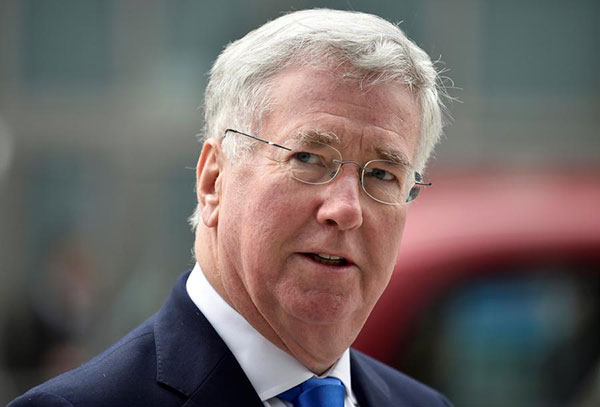UK government in disarray over sex allegations
 |
|
British Defence Secretary Michael Fallon arrives at the National Cyber Security Center in London, Britain, Feb 14, 2017. [Photo/Agencies] |
The fragility of the British government led by Prime Minister Theresa May was emphasized by the resignation of Defence Secretary Michael Fallon late on Wednesday after he admitted behaving inappropriately with a journalist 15 years ago.
May named Gavin Williamson as the new defense minister on Thursday but commentators expect her government could be further damaged by a wave of allegation of sexual misconduct among ministers and politicians that has not yet subsided.
The revelations were inspired by the more than 50 allegations of rape, assault and harassment against the Hollywood producer Harvey Weinstein. This led to an international viral campaign #metoo in which women said they were abused and further campaigns against a culture of abuse in arenas such as politics, media and theater.
The accusations are particularly awkward for May because of the fragility of her government and the seriousness of its predicament in trying to exit the European Union.
In addition to Fallon, four other serving ministers have been implicated in the current wave of allegations, including Damian Green, May's foremost Cabinet ally. He and two others deny any impropriety but one has admitted to asking his assistant to buy sex toys for him.
May cannot govern without the assistance of the Northern Irish Democratic Unionist Party, after failing to win the general election she called earlier this year and can ill afford further disruption. The prime minister will be waiting nervously for the newspapers on Sunday which specialize in revelations of this kind.
The two main political parties, Labour and the Conservatives have both been accused of ignoring complaints of rape, assault and harassment from women. Senior officials have tended to place the good image of the party above the needs and rights of junior members, especially women.
The Weinstein scandal has caused a powerful reaction against the power structures in many areas which legitimize the abuse of women and sometimes men. In British politics, party disciplinarians have tended to use knowledge of bad or criminal behavior as a way of controlling miscreants for the benefit of the party rather than the victim.
Female politicians have united to demand that scrutiny of allegations of misconduct should be handled by an independent figure rather than each party's "whip", an official responsible for discipline.
The scandal comes at a time when women have a more prominent role in the UK than ever before. Five parties are led by women, the UK government and one of the devolved governments. Ruth Davison, the leader of the Scottish Conservatives, said that in spite of this, it was necessary to root out sexism and misogyny in British politics. "The house clearing that is about to happen needs to happen and we can never go back to where we were before," she said.


















